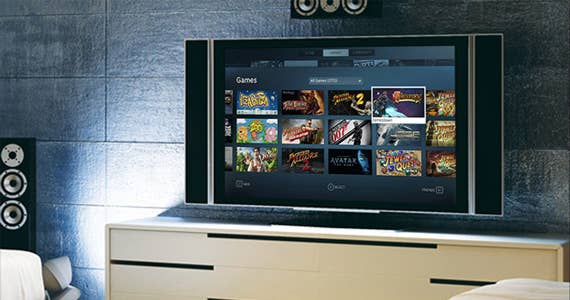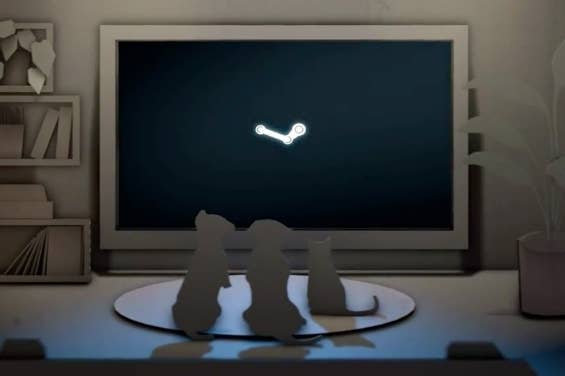Valve: Biggest threat to the next generation?
Chris Morris argues that a Steam Box could make life difficult for Microsoft and Sony in the next couple years
With Nintendo having launched its next generation system and Microsoft and Sony waiting in the wings, plenty of analysts, observers and thumb-suckers are rubbing their worry beads about the impact of mobile and tablet gaming.
The PC is mentioned in passing, though few believe it will be a viable threat, due to the challenges that come with different hardware specifications. They also note that things like driver updates and the perception of more frequent component updates can be intimidating for the mass audience. But if the recent whispers of Valve's plans to launch a game hardware system prove true, that could upend the playing field.
Steam has always been a spoiler for the game industry's status quo. No one knows exactly how successful it is, thanks to Valve's airtight secrecy on sales numbers - but we know it's huge. And the company has always stayed out of the blood match for the living room.
According to an interview with Kotaku, Valve's about to get in the game, though - and that could have a major ripple effect on the next generation. Here are five ways a "Steam Box" could make things difficult for the next Xbox and PlayStation.
Fracturing the core
While Microsoft and Sony have learned the importance of catering to the mainstream audience, it's the core gamer who's still their bread and butter. Those are the players who regularly buy new titles. And more importantly, they're influencers whose opinions can help drive sales.
Historically, they've assigned their loyalty to a primary system, which has led to much of the Sony vs. Microsoft sniping that's so common in forums. But a large percentage of the core audience is unified in its love of PC gaming.

A Steam Box won't stop the core from buying an Xbox or PlayStation, but it could easily distract them away from those systems. And the entry of a third high-definition, AAA system (fourth, if you count Nintendo as part of this fight - though that company tends to exist in its own space), could further split the core gaming community - possibly severely impacting the revenue streams of Sony and Microsoft.
Day one PC releases
While AAA games still make it to PC these days, there's very often a delay. Piracy fears and a focus on the larger console audience make this somewhat understandable.
Should the Steam Box gather a notable installed base, however, that could cause publishers to rethink that strategy, to the delight of PC players. You still aren't likely to see console flagships like Halo, Uncharted or Gears of War on the PC in the near term, but you may not have to wait for things like Grand Theft Auto or Assassin's Creed.
Pricing shake up
"A Steam Box could hurt the retailer even more than competing console systems, since Valve is one of the biggest proponents of digital downloads in the industry"
Console game prices follow a pretty standard formula. During the first week or two of a release window, they're $60 - with retail discounts typically rare in that period. After that, the sales start - and generally it's gone from shelves within six months or so, unless it manages to become a breakthrough hit.
Steam has shown there's plenty of value in back catalog games. And it has been equally efficient at shaking up traditional pricing models, with its quarterly sales and surprise deep discounts. Publishers are already comfortable with the way things sell on Steam and know the benefits of those sorts of discounts - and there's no reason to think they'd become gun-shy about them now.
If a larger set of players gets used to them, that's going to put pressure on traditional retail stores to lower or be more flexible with their own pricing models.
DRM headaches
A Steam Box won't be quite the nirvana some gamers are dreaming of, however. The threat of piracy still looms - and publishers are going to be especially wary of it.
Ubisoft's DRM woes of earlier this year demonstrate that publishers still aren't exactly sure how to address the issue. And while the French company dropped its first stab at protecting itself, it's certain to come up with an alternative, as is every other publisher.
For most people, this won't be a major issue, but for some it could be a nightmare that could make consoles appealing again.
GameStop headaches
The console ecosystem extends far beyond Microsoft and Sony. GameStop might cause some grumbling among players, but it's a huge part of the system. A Steam Box could hurt the retailer even more than competing console systems, since Valve is one of the biggest proponents of digital downloads in the industry.
GameStop has plans in place already to sell things like Steam gift cards, but it's also planning its own digital distribution service to compete against Steam. If Valve has a foothold in the living room in addition to its domination of the field on the PC, that's going to force GameStop to get even more creative to remain relevant in the game industry of tomorrow.

